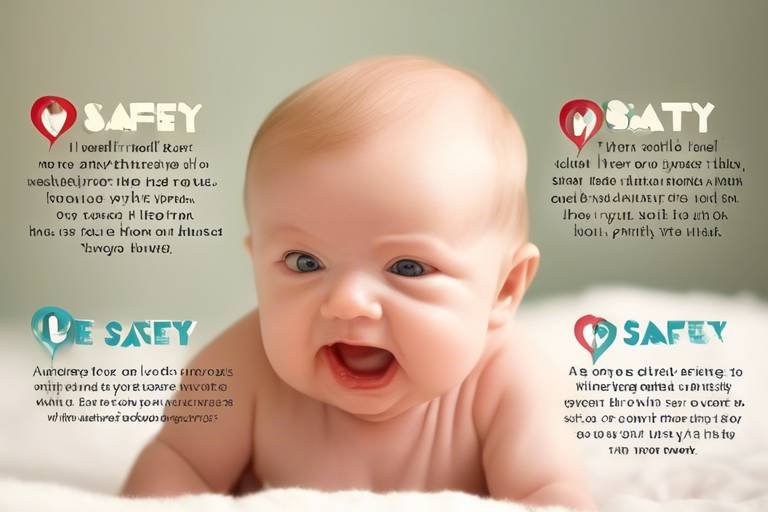Clutter-Free: The Impact of Tidy Spaces on Family Health and Wellness
Have you ever walked into a room that felt so chaotic that your mind started racing? Or perhaps you've experienced the calming effect of a neat and organized space? The truth is, our living environments play a profound role in our overall health and wellness, especially for families. When we talk about a clutter-free home, we're not just discussing aesthetics; we're diving into a lifestyle that promotes physical health, enhances mental clarity, and nurtures stronger family bonds. Imagine a home where every item has its place, where chaos is replaced by calm—this is the essence of organized living.
In today's fast-paced world, clutter can easily accumulate, leading to feelings of overwhelm and stress. The impact of a tidy space goes beyond mere appearance; it creates an atmosphere that fosters well-being. Families thrive in environments that are not only clean but also conducive to positive interactions. So, how does a clutter-free home contribute to the health and happiness of your family? Let’s explore the various benefits and strategies for maintaining a tidy living space.
Picture this: you come home after a long day, and instead of a chaotic mess, you’re greeted by a serene, organized space. This simple change can significantly enhance your mental clarity and reduce stress levels. Studies have shown that a clean and organized environment promotes a healthier family dynamic, leading to improved emotional well-being for all members. When you declutter, you’re not just clearing physical space; you’re also creating mental space.
Think about the last time you were surrounded by clutter. Did you feel anxious? Distracted? This is because clutter can overwhelm our senses, making it difficult to focus on what truly matters—like spending quality time with family. By fostering a tidy home, families can enjoy:
- Enhanced Focus: With fewer distractions, family members can concentrate better on tasks and each other.
- Reduced Stress: A clean environment can lead to lower stress levels, creating a more peaceful atmosphere.
- Improved Mood: A tidy space can uplift spirits and promote a sense of accomplishment.
Maintaining a clutter-free environment isn't just about aesthetics; it has tangible benefits for your family's physical health. A tidy home reduces the risk of accidents and injuries, which is especially important for families with young children or elderly members. Moreover, a clean living space encourages healthier habits, such as regular cleaning and increased physical activity. When you declutter, you’re also making room for healthier lifestyle choices.
Did you know that clutter can trap dust, mold, and allergens? These hidden dangers can lead to respiratory problems, especially for family members with allergies or asthma. By keeping your home tidy, you minimize these risks, creating a healthier atmosphere for everyone. A tidy home is not just visually appealing; it’s a sanctuary for your family’s health.
Implementing effective cleaning strategies can significantly reduce allergens in your home. Here are some tips:
- Regular Dusting: Dust surfaces weekly to prevent buildup.
- Vacuum Frequently: Use a vacuum with a HEPA filter to trap allergens.
- Wash Bedding Regularly: Hot water kills dust mites and other allergens.
Good air quality is vital for health. A clutter-free environment allows for better ventilation and circulation, reducing the buildup of harmful particles. When your home is tidy, it not only looks great but also promotes respiratory health by ensuring the air you breathe is clean and fresh.
A tidy home fosters a welcoming environment where family members can interact more positively. When spaces are organized, it becomes easier to communicate, bond, and enjoy quality time together. Imagine a family game night without the distraction of clutter! A clean environment encourages more meaningful interactions and strengthens family relationships.
Establishing a clutter-free home requires intentional effort and organization. It’s not just about cleaning; it’s about creating a lifestyle that values tidiness. Here are some practical tips and strategies for families to maintain a tidy living space:
Utilizing various organizational tools, such as storage bins, shelving, and labels, can help families manage their belongings efficiently. These tools make it easier to maintain a clean and orderly home, ensuring that everything has its place. When items are organized, it saves time and reduces frustration, allowing families to focus on what truly matters—each other.
Engaging all family members in the decluttering process fosters responsibility and teamwork. When everyone contributes to maintaining a tidy home, it becomes a shared goal that everyone understands. This not only makes the task easier but also instills a sense of pride and ownership in each family member.
1. How often should I declutter my home?
It's recommended to declutter your home at least once every season. However, regular maintenance, such as weekly tidying up, can help keep clutter at bay.
2. What are some quick tips for decluttering?
Start small! Tackle one room or area at a time. Use the "one in, one out" rule—when you bring a new item in, let go of an old one. And don’t forget to donate items that are still in good condition!
3. Can a clutter-free home really improve my family's health?
Absolutely! A tidy home reduces stress, improves air quality, and encourages healthier habits, all of which contribute to better overall health for your family.

The Psychological Benefits of a Tidy Home
Imagine walking into your home after a long day, and instead of being greeted by chaos, you're welcomed by a serene, organized space. A tidy home can do wonders for your mental state! It's not just about aesthetics; the psychological benefits of an organized environment are profound and far-reaching. When your space is clutter-free, it can significantly enhance your mental clarity and reduce stress levels. This creates a healthier family dynamic, allowing each member to thrive emotionally.
Think about it: when you’re surrounded by clutter, your brain is constantly processing all that visual chaos. This can lead to feelings of being overwhelmed and anxious. In contrast, a tidy space promotes a sense of calm and control. You might ask, "How does this really work?" Well, a clean home can trigger a sense of accomplishment and peace, making it easier for everyone to focus on what truly matters—family time, hobbies, and personal growth.
Furthermore, a tidy home fosters positive interactions among family members. When the environment is organized, it encourages open communication and bonding. Families can gather in a clean living room without distractions, share stories, and create lasting memories. In a clutter-free space, it's easier to engage in activities together, whether it's playing games, cooking, or simply enjoying each other's company.
Additionally, maintaining an organized environment can lead to improved self-esteem. When you take pride in your living space, it reflects on how you feel about yourself. You become more motivated to keep things tidy, and this positive feedback loop can enhance your overall well-being. So, not only does a tidy home benefit mental health, but it also encourages a lifestyle where everyone feels valued and respected.
To sum it up, the psychological benefits of a tidy home are immense. It can lead to:
- Reduced stress and anxiety
- Enhanced focus and productivity
- Improved family relationships
- Higher self-esteem and motivation
Incorporating tidiness into your home life is a step towards not just a cleaner space, but a happier, healthier family. So, why not start today? After all, a little organization can go a long way in creating a peaceful sanctuary for you and your loved ones.

Physical Health Advantages of Decluttering
Maintaining a clutter-free environment is not just about aesthetics; it plays a crucial role in promoting physical health for families. Imagine living in a space where every item has its place, and you can move freely without tripping over toys or stacks of papers. This sense of order can lead to a significant reduction in accidents and injuries, especially for children and elderly family members. When you declutter, you pave the way for a safer home, which is the first step toward a healthier lifestyle.
Furthermore, a tidy home encourages healthier habits. Think about it: when your space is organized, you're more likely to engage in regular cleaning and maintenance routines. This not only keeps your environment in check but also promotes increased physical activity. Instead of spending your weekends cleaning up chaos, you can enjoy family activities or outdoor adventures. A clutter-free home creates a mindset geared towards health and wellness, making it easier to prioritize physical activity.
Another significant aspect of decluttering is its impact on air quality. Clutter tends to trap dust, mold, and other allergens, which can lead to respiratory issues over time. For families, especially those with members suffering from allergies or asthma, maintaining a clean environment is paramount. A tidy home minimizes these risks, creating a healthier atmosphere for everyone. In fact, studies have shown that homes with less clutter have better air quality, which is vital for overall health.
As clutter accumulates, it can become a breeding ground for dust mites, pet dander, and mold. These allergens can trigger various respiratory problems, making it essential to keep your living space organized. By regularly decluttering and cleaning, you can significantly reduce the presence of these harmful particles. A tidy home not only looks better but also helps in creating a safe haven for your family, particularly for those vulnerable to respiratory conditions.
Implementing effective cleaning strategies is a great way to reduce allergens in your home. Here are some practical tips:
- Regular Dusting: Make it a habit to dust surfaces weekly to prevent allergens from settling.
- Vacuum Frequently: Use a vacuum cleaner with a HEPA filter to trap dust and allergens effectively.
- Wash Bedding Regularly: Clean sheets and pillowcases in hot water to eliminate dust mites.
Good air quality is fundamental for health. A clutter-free environment allows for better ventilation and circulation, reducing the buildup of harmful particles. When air can flow freely, it promotes respiratory health and overall well-being. Families should consider using air purifiers and keeping windows open when possible to enhance air quality further. The connection between a tidy space and good air quality is undeniable, making decluttering not just a cosmetic choice but a health-conscious decision.
In summary, the physical health advantages of decluttering are extensive. From reducing accidents and promoting physical activity to improving air quality and minimizing allergens, the benefits are clear. By creating a clutter-free environment, families can foster a healthier lifestyle, paving the way for a happier and more vibrant home.
Q: How often should I declutter my home?
A: It's advisable to declutter regularly, ideally every few months. However, a quick tidy-up can be done weekly to maintain order.
Q: What are the first steps to start decluttering?
A: Begin with one room or area at a time. Set aside dedicated time, and sort items into categories: keep, donate, or discard.
Q: Can decluttering really improve my mental health?
A: Yes! A tidy environment can reduce stress and anxiety, leading to improved mental clarity and overall emotional well-being.

Reducing Allergens and Respiratory Issues
Clutter can be more than just an eyesore; it can also be a breeding ground for allergens that threaten the health of your family. Dust, mold, and pet dander tend to accumulate in disorganized spaces, creating an environment ripe for respiratory issues. For families, especially those with members suffering from allergies or asthma, maintaining a tidy home is crucial. It’s like trying to breathe fresh air in a crowded room; the more stuff you have around, the harder it is to find that clarity. A clutter-free environment not only minimizes these allergens but also enhances the overall air quality, making it easier for everyone to breathe freely.
When you think about it, your home should be a sanctuary—a place where you and your loved ones can relax without worrying about sneezing fits or asthma attacks. By reducing clutter, you’re not just cleaning; you’re creating a healthier atmosphere. This can be achieved through a few simple strategies:
- Regular Cleaning: Make it a habit to dust and vacuum regularly. This helps eliminate allergens that settle on surfaces.
- Declutter High-Traffic Areas: Focus on places where family members spend the most time, such as living rooms and bedrooms.
- Use Air Purifiers: Consider investing in air purifiers that can filter out harmful particles, improving the air quality in your home.
Implementing these strategies can significantly reduce the presence of allergens. Additionally, good air quality is vital for health. A tidy home allows for better ventilation and airflow, which reduces the buildup of harmful particles. Think of it like opening the windows on a sunny day; it brings in fresh air and pushes out the stale, musty stuff that can linger in a cluttered space.
The benefits of a clutter-free home extend beyond just reducing allergens. It can also lead to fewer respiratory issues, allowing family members to enjoy their time at home without the nagging worry of health complications. In essence, a tidy space is a healthy space, and it’s essential for fostering a nurturing environment for your loved ones.

Cleaning Strategies for Allergen Reduction
When it comes to maintaining a healthy home, cleaning strategies play a crucial role, especially for families dealing with allergies or respiratory issues. Implementing effective cleaning techniques not only helps to reduce allergens but also promotes a sense of well-being within the household. So, where do we start? First and foremost, it's essential to establish a regular cleaning routine that includes dusting, vacuuming, and washing surfaces frequently. Think of it as giving your home a breath of fresh air!
One of the most effective strategies is to use HEPA filters in your vacuum cleaners and air purifiers. These filters are designed to trap tiny particles, including dust mites, pet dander, and pollen, which can wreak havoc on your family's health. Additionally, consider using a damp cloth for dusting instead of a dry one. This technique helps to capture dust rather than just moving it around, ensuring that your surfaces stay cleaner for longer.
Another important aspect of allergen reduction is the frequency of cleaning. Here’s a simple breakdown of what to clean and how often:
| Cleaning Task | Frequency |
|---|---|
| Dusting surfaces | Weekly |
| Vacuuming carpets and rugs | 2-3 times a week |
| Washing bedding and curtains | Bi-weekly |
| Cleaning hard floors | Weekly |
Furthermore, don’t forget about the importance of decluttering. The more items you have lying around, the more dust and allergens can accumulate. By keeping surfaces clear and minimizing the number of decorative items, you make cleaning easier and more effective. Consider creating a designated spot for everything, which not only helps with organization but also reduces the temptation to let things pile up.
Lastly, remember to involve the entire family in the cleaning process. When everyone pitches in, not only does it make the task lighter, but it also teaches children the importance of maintaining a clean environment. Plus, it can turn cleaning into a fun family activity! So, grab some music, set a timer, and see how much you can accomplish together in just 30 minutes. It’s amazing what a little teamwork can do!
- How often should I vacuum to reduce allergens? It's recommended to vacuum at least 2-3 times a week, especially if you have pets.
- Can air purifiers help with allergies? Yes, using HEPA filter air purifiers can significantly improve air quality by trapping allergens.
- What cleaning products are best for allergy sufferers? Opt for unscented, hypoallergenic cleaning products to minimize irritation and allergic reactions.

Importance of Air Quality in Tidy Spaces
When it comes to maintaining a healthy home, the quality of the air we breathe is often overlooked. A clutter-free environment plays a crucial role in ensuring that our living spaces are not just visually appealing but also physically healthy. Poor air quality can lead to various health issues, including respiratory problems and allergies. By keeping our spaces tidy, we allow for better ventilation and circulation, which reduces the buildup of harmful particles that can linger in the air.
Imagine walking into a room filled with clutter—boxes piled high, dust collecting on surfaces, and a musty smell lingering in the air. It’s not just uninviting; it’s potentially hazardous to your health. When spaces are cluttered, airflow is restricted, leading to a stagnant environment where dust, mold, and allergens can thrive. This is especially concerning for families with members who suffer from asthma or other respiratory conditions. A clean and organized home, on the other hand, promotes a refreshing atmosphere that can significantly enhance the overall well-being of its inhabitants.
Here are some key benefits of maintaining good air quality in tidy spaces:
- Reduced Allergens: A clutter-free home minimizes the places where dust and allergens can accumulate, leading to fewer allergy flare-ups.
- Enhanced Respiratory Health: Improved airflow helps dilute indoor pollutants, making it easier to breathe.
- Better Mental Clarity: Clean air contributes to a clearer mind, enabling better focus and productivity.
Moreover, the importance of air quality extends beyond just physical health. It also affects our emotional well-being. A fresh, clean environment can uplift your mood and create a sense of calm. Think about how you feel when you step into a bright, airy room versus a cluttered, dusty space. The difference is palpable, right? This psychological effect can foster a more positive and harmonious family dynamic, as everyone benefits from a pleasant living environment.
In conclusion, keeping our spaces tidy isn’t just about aesthetics; it’s a fundamental aspect of maintaining good air quality. By prioritizing organization and cleanliness, we can create a healthier home for our families, promoting both physical and emotional wellness. So, the next time you consider decluttering, remember that you’re not just making your home look good—you’re also making it a better place to breathe and thrive.

Encouraging Healthy Family Interactions
Imagine walking into a home where everything has its place, where the air feels light, and where the atmosphere invites laughter and conversation. A tidy home does more than just look good; it creates a welcoming environment that encourages family members to interact positively. When spaces are organized, it reduces distractions and allows families to focus on what truly matters—each other. Think of it as setting the stage for a play; when the stage is clear and tidy, the actors can shine!
In a clutter-free home, family members are more likely to engage in meaningful conversations and activities together. Without the chaos of disorganization, there’s less frustration and more room for connection. Picture this: instead of searching through piles of clothes or toys, family members can easily find what they need, leading to spontaneous game nights, cooking together in the kitchen, or simply enjoying a quiet moment on the couch. This ease of access fosters a sense of community, as everyone feels they can contribute to the shared space.
Moreover, a tidy environment promotes collaboration and teamwork. When everyone pitches in to maintain the space, it cultivates a sense of responsibility and collective ownership. For instance, assigning simple tasks like tidying up the living room or organizing a shared family area can turn into a fun bonding experience. You can even create a mini-challenge to see who can tidy their space the fastest, turning chores into a game. This not only keeps the home clean but also strengthens family ties through shared efforts.
Furthermore, the emotional benefits of a tidy home extend to improved communication. When family members feel relaxed in their environment, they are more likely to open up and share their thoughts and feelings. This can lead to deeper conversations about daily experiences, challenges, and aspirations. In contrast, a cluttered space can lead to feelings of overwhelm and stress, making it harder for family members to connect. So, keeping the home organized is not just about aesthetics; it’s about nurturing emotional well-being.
In summary, fostering healthy family interactions within a tidy home can create a ripple effect that enhances overall family dynamics. By maintaining a clutter-free environment, families can enjoy better communication, increased bonding opportunities, and a more harmonious living space. After all, a clean home is not just a reflection of order; it’s a foundation for love, support, and connection.
- How can a tidy home improve family interactions? A tidy home reduces distractions and stress, allowing family members to focus on each other, engage in meaningful conversations, and participate in shared activities.
- What are some easy ways to maintain a clutter-free environment? Regularly decluttering, involving all family members in cleaning tasks, and using organizational tools like bins and shelves can help maintain order.
- Can a clean home really affect mental health? Yes! A clean and organized space can significantly reduce stress levels, enhance mental clarity, and improve overall emotional well-being.

Creating a Clutter-Free Environment
Establishing a clutter-free home is not just a one-time project; it's a lifestyle choice that requires intentional effort and organization. Imagine walking into your living space and feeling an immediate sense of calm wash over you. This is the magic of a tidy environment! To create and maintain such a space, families need to adopt practical strategies that promote order and cleanliness. Start by assessing your current situation—what items do you truly need, and what can be let go? This process can be likened to a refreshing spring cleaning, where you shed the old to make way for the new.
One effective way to maintain a clutter-free environment is by utilizing various organizational tools. Storage bins, baskets, and shelving units can be your best friends in this journey. For instance, consider designating a specific bin for each family member's belongings. This not only keeps items organized but also makes it easier to tidy up when everyone knows where their things belong. Additionally, using clear storage containers allows you to see the contents at a glance, reducing the chances of forgetting what you have and preventing unnecessary purchases.
Another essential aspect of creating a clutter-free environment is involving all family members in the decluttering process. When everyone pitches in, it fosters a sense of responsibility and teamwork. You might say, “Hey, let’s tackle the living room together this weekend!” This not only makes the task more manageable but also teaches children the importance of maintaining a tidy space. Consider setting up a fun family challenge where each member finds a certain number of items to donate or discard. This can turn a mundane task into a bonding activity, enhancing family relationships while promoting a healthier living space.
Regular maintenance is key to keeping your home clutter-free. Establish a routine that includes daily tidying sessions, where everyone spends just 10-15 minutes putting things back in their designated places. You could even create a weekly cleaning schedule that outlines specific tasks for each family member. This approach not only helps in managing clutter but also instills a sense of discipline and order in children, teaching them valuable life skills.
Finally, remember that creating a clutter-free environment is a journey, not a destination. It requires patience and persistence. Celebrate your progress, no matter how small, and adapt your strategies as your family grows and changes. By fostering a culture of organization and cleanliness, you’ll not only enhance your living space but also contribute to the overall health and wellness of your family.
- How often should I declutter my home? It's recommended to declutter every few months, but daily maintenance is crucial to prevent buildup.
- What should I do with items I no longer need? Donate, recycle, or sell items that are in good condition. For damaged items, consider proper disposal methods.
- Can a clutter-free environment really improve my family's health? Absolutely! A tidy space reduces stress and allergens, promoting mental and physical well-being.

Organizational Tools and Techniques
When it comes to creating a clutter-free environment, the right organizational tools and techniques can make all the difference. Think of your home as a blank canvas; without the right brushes and colors, it can quickly become chaotic. By utilizing various tools, you can transform that chaos into a masterpiece of organization. One of the most effective ways to start is by investing in storage solutions. Storage bins, baskets, and shelves can help categorize items, making it easier to find what you need when you need it. Imagine walking into a room and immediately knowing where everything is—what a relief that would be!
In addition to storage bins, consider using labels. Labels can be a game-changer in maintaining order. They not only help you quickly identify where items belong, but they also encourage everyone in the family to return items to their designated spots. It’s like having a personal assistant reminding you where things go! For example, label boxes for toys, books, and seasonal items. This simple technique can significantly reduce clutter and save time during clean-up.
Another effective technique is to employ the one-in, one-out rule. This means that for every new item you bring into your home, you should remove one. This practice helps prevent accumulation and encourages mindful shopping. It’s easy to get carried away with new purchases, but by adhering to this rule, you’ll keep your space from becoming overcrowded. Think of it as a balancing act—keeping your home light and airy rather than weighed down by excess stuff.
To further enhance your organizational efforts, consider creating a cleaning schedule. This schedule can outline daily, weekly, and monthly tasks that keep clutter at bay. For instance, you might designate Mondays for decluttering the living room, Wednesdays for organizing the kitchen, and Saturdays for tackling the garage. A well-structured cleaning schedule not only keeps your home tidy but also instills a sense of routine and responsibility among family members.
Finally, it’s essential to involve everyone in the process of maintaining a tidy space. When each family member has a role in organizing, it fosters a sense of teamwork. You might even consider making it a fun family activity! Set aside time on the weekends to declutter together, turning it into a game or challenge. You could even reward the family with a fun outing once you achieve your organizational goals. After all, a tidy home is not just about aesthetics; it’s about creating a healthy, welcoming environment for everyone.
- What are some easy storage solutions for small spaces? Storage ottomans, under-bed storage boxes, and wall-mounted shelves are great options for maximizing space.
- How often should I declutter my home? It's beneficial to declutter at least once a season, but you can do it more frequently if you notice clutter accumulating.
- Can organizing really improve my family's health? Absolutely! A tidy space can reduce stress, improve air quality, and foster better family interactions.

Involving Family Members in Decluttering
When it comes to maintaining a clutter-free home, involving all family members in the decluttering process is crucial. Think of it as a team sport where everyone plays a position to achieve a common goal: a tidy and organized living space. By engaging each person in the family, not only do you lighten your workload, but you also instill a sense of responsibility and ownership over the shared environment. Have you ever noticed how kids are more likely to take care of their toys if they've had a hand in organizing them? It's all about creating that connection!
One effective way to start is by holding a family meeting to discuss the importance of decluttering. Use this time to explain how a tidy home impacts everyone’s health and wellness. You might say something like, "When our home is organized, we can find things more easily, reducing stress and saving time!" This conversation sets the stage for collaboration and encourages everyone to contribute their ideas and feelings about the clutter in your home.
After the meeting, create a decluttering plan together. This could involve tackling one room at a time or setting aside a specific day each week dedicated to decluttering. To make it more engaging, you could turn it into a friendly competition. For example, challenge each family member to see who can declutter the most items in a set amount of time. You can even reward the winner with a small treat—who doesn't love a little incentive?
It's also important to assign specific tasks based on each person's strengths and preferences. For instance, younger children might enjoy sorting toys, while older kids can handle more complex tasks like organizing books or clothes. Here’s a simple table that outlines potential tasks for different age groups:
| Age Group | Decluttering Tasks |
|---|---|
| Preschoolers | Sorting toys, putting away shoes |
| Elementary | Organizing books, clearing out school supplies |
| Teens | Managing clothes, decluttering personal spaces |
As you embark on this decluttering journey, remember to celebrate small victories. After completing a room, take a moment to admire your hard work together. This not only reinforces the positive behavior but also builds a sense of accomplishment. You might even consider creating a “before and after” photo album to visually track your progress over time.
Lastly, make decluttering a regular habit rather than a one-time event. Set aside a few minutes each week for everyone to assess their personal spaces. This ongoing commitment will help maintain the tidy atmosphere you’ve worked hard to create, ensuring that your home remains a sanctuary for all family members.
Q: How often should we declutter as a family?
A: It’s beneficial to declutter regularly, ideally once a month, but setting aside a few minutes each week can help maintain a tidy space.
Q: What if family members resist participating?
A: Encourage open communication about the benefits of decluttering. You might find that once they see the positive changes, they’re more willing to help out.
Q: Can decluttering really impact our family’s health?
A: Absolutely! A tidy home reduces stress, minimizes allergens, and promotes healthier habits, all of which contribute to better overall family health.
Frequently Asked Questions
- How does a clutter-free home improve mental health?
A clutter-free home can significantly enhance mental clarity and reduce stress levels. When your space is organized, it creates a calming environment that allows family members to focus better and feel more at ease. Imagine walking into a serene room where everything is in its place; it’s like a breath of fresh air for your mind!
- What are the physical health benefits of decluttering?
Maintaining a tidy space not only prevents accidents but also encourages healthier habits. Regular cleaning and organizing can lead to increased physical activity, which is essential for overall family health. Think of it as a workout disguised as a chore—who knew cleaning could be so beneficial?
- How can decluttering reduce allergens in the home?
Clutter can trap dust, mold, and allergens, which can lead to respiratory issues. By keeping your home tidy, you minimize these risks, creating a healthier atmosphere, especially for family members with allergies or asthma. It’s like giving your home a fresh start, allowing everyone to breathe easier!
- What cleaning strategies help with allergen reduction?
Effective cleaning strategies include regular dusting, vacuuming, and using air purifiers. These practices help reduce allergens and improve air quality in your home. Think of it as your home’s defense team against sneezes and sniffles!
- Why is air quality important in a tidy space?
Good air quality is vital for health, and a clutter-free environment allows for better ventilation and circulation. This reduces the buildup of harmful particles, promoting respiratory health. Imagine your home as a sanctuary where every breath feels refreshing!
- How does a tidy home encourage family interactions?
A clean and organized home fosters a welcoming environment, enhancing communication and bonding among family members. When your space is tidy, it’s easier to relax and enjoy time together, like a cozy gathering spot where everyone feels comfortable.
- What are some practical tips for creating a clutter-free environment?
Some practical tips include utilizing organizational tools like storage bins and shelving, and setting up a regular decluttering schedule. Think of these tools as your trusty sidekicks in the quest for a tidy home!
- How can I involve my family in the decluttering process?
Engaging all family members in decluttering fosters responsibility and teamwork. Make it a fun activity by turning it into a game or challenge. When everyone pitches in, it not only lightens the load but also strengthens family bonds—who doesn’t love a little friendly competition?



















